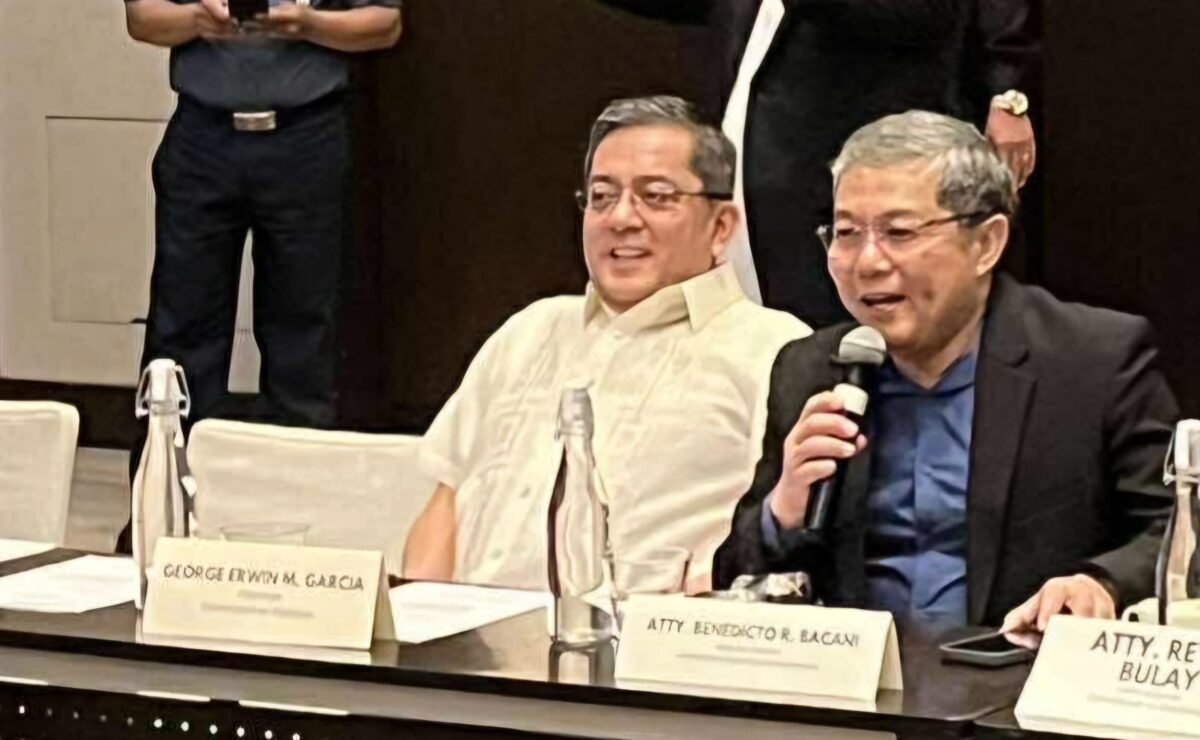Comelec eyes postponement of Bangsamoro polls after SC issues TRO

IAG executive director Benedicto Bacani (right) presides over a dialogue among BARMM stakeholders about the fate of the Oct. 13 regional elections. Beside him is Comelec Chair George Garcia. PHOTO FROM IAG
MANILA, Philippines – The Commission on Elections (Comelec) is eyeing the postponement of the Bangsamoro parliamentary elections scheduled for Oct. 13, after it had to suspend its preparations due to a temporary restraining order (TRO) issued by the Supreme Court.
In an ambush interview after a dialogue forum on the Bangsamoro parliamentary elections, Comelec Chair George Erwin Garcia said on Thursday that the agency will be holding a meeting to discuss the postponement of the polls that was supposed to be held on Oct. 13.
Garcia said the Comelec’s Project Management Office and law department had already recommended the postponement of the elections given how it was already “factually impossible” to hold the event since there is currently no clear law guiding the distribution of the parliamentary districts in the Bangsamoro.
“We currently have recommendations from our project management office and those from the field, that we really cannot [finish preparations] in the remaining days before Oct. 13…it is not just legally impossible, it is factually impossible,” he said.
READ: Comelec suspends preparation for Bangsamoro parliamentary polls
Garcia explained that the Comelec currently does not know what law it should implement for the distribution of the districts since the Supreme Court issued a TRO enjoining the Commission from implementing Bangsamoro Autonomy Act No. 77 pending two cases questioning its constitutionality.
BAA 77 redistributes the seven district seats originally allotted for Sulu after the high court ruled last year that the province is not a part of the Bangsamoro Autonomous Region in Muslim Mindanao (BARMM).
The enactment of BAA 77 repealed BAA 58, which was the earlier law on the distribution of district seats and what the Comelec had based its preparations on, Garcia noted. This meant that the agency also could not implement BAA 58 as it was already a “dead” law due to BAA 77.
“We need more or less four to five weeks to conduct a proper election. If the elections will not be conducted freely, peacefully, and with the highest integrity, why proceed?” Garcia said. “If there is a remedy provided by law, why not just take it?”
According to Garcia, the impending postponement of the Bangsamoro polls would be based on Section 5 of the Omnibus Election Code, which allows the Comelec to postpone elections for “any serious cause,” provided that all interested parties will be given equal chances to be heard.
READ: High court halts BARMM redistricting law
Reasons for postponement may include “violence, terrorism, loss or destruction of election paraphernalia or records, force majeure, and other analogous causes” that would make it impossible to conduct a “free, orderly and honest” election in any political subdivision.
“Force majeure has a broad definition. It means something happened that you did not expect, which prevented you from performing an action. So, it means we can consider something like that, especially with the TRO that was issued, or with the pending cases,” Garcia said.
He noted that it might take the agency a whole week to discuss the possible postponement, as the Comelec would also have to consult various stakeholders from the BARMM, including the Independent Election Monitoring Council which conducted the dialogue forum on Thursday.
The Comelec chief did not provide a date for when the elections would be held after its postponement, but he noted that the election code provides that the polls should be rescheduled “not later than thirty days after the cessation of the cause for such postponement or suspension of the election or failure to elect.” /jpv


















